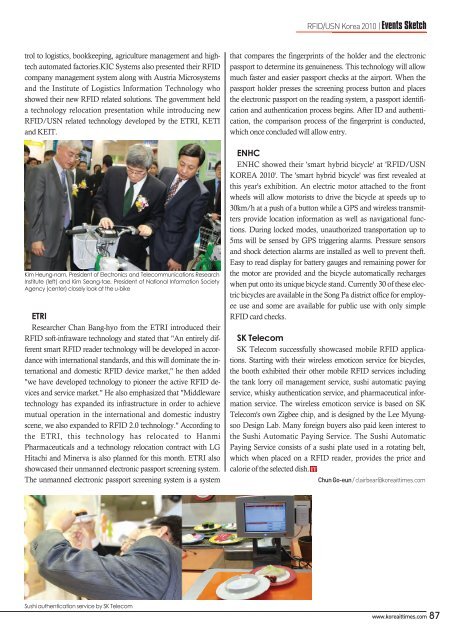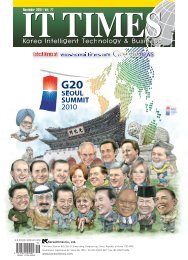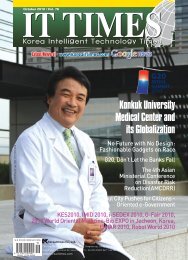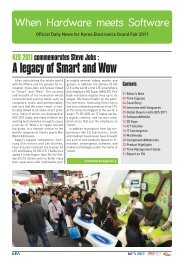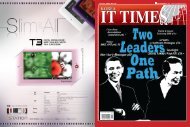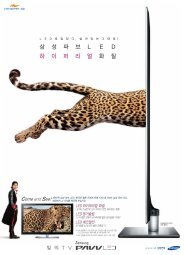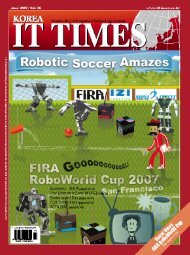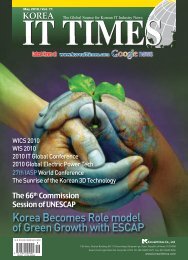You also want an ePaper? Increase the reach of your titles
YUMPU automatically turns print PDFs into web optimized ePapers that Google loves.
RFID/USN <strong>Korea</strong> 2010 | Events Sketch<br />
trol to logistics, bookkeeping, agriculture management and hightech<br />
automated factories.KIC Systems also presented their RFID<br />
company management system along with Austria Microsystems<br />
and the Institute of Logistics Information Technology who<br />
showed their new RFID related solutions. The government held<br />
a technology relocation presentation while introducing new<br />
RFID/USN related technology developed by the ETRI, KETI<br />
and KE<strong>IT</strong>.<br />
Kim Heung-nam, President of Electronics and Telecommunications Research<br />
Institute (left) and Kim Seang-tae, President of National Information Society<br />
Agency (center) closely look at the u-bike<br />
ETRI<br />
Researcher Chan Bang-hyo from the ETRI introduced their<br />
RFID soft-infraware technology and stated that "An entirely different<br />
smart RFID reader technology will be developed in accordance<br />
with international standards, and this will dominate the international<br />
and domestic RFID device market," he then added<br />
"we have developed technology to pioneer the active RFID devices<br />
and service market." He also emphasized that "Middleware<br />
technology has expanded its infrastructure in order to achieve<br />
mutual operation in the international and domestic industry<br />
scene, we also expanded to RFID 2.0 technology." According to<br />
the ETRI, this technology has relocated to Hanmi<br />
Pharmaceuticals and a technology relocation contract with LG<br />
Hitachi and Minerva is also planned for this month. ETRI also<br />
showcased their unmanned electronic passport screening system.<br />
The unmanned electronic passport screening system is a system<br />
that compares the fingerprints of the holder and the electronic<br />
passport to determine its genuineness. This technology will allow<br />
much faster and easier passport checks at the airport. When the<br />
passport holder presses the screening process button and places<br />
the electronic passport on the reading system, a passport identification<br />
and authentication process begins. After ID and authentication,<br />
the comparison process of the fingerprint is conducted,<br />
which once concluded will allow entry.<br />
ENHC<br />
ENHC showed their 'smart hybrid bicycle' at 'RFID/USN<br />
KOREA 2010'. The 'smart hybrid bicycle' was first revealed at<br />
this year's exhibition. An electric motor attached to the front<br />
wheels will allow motorists to drive the bicycle at speeds up to<br />
30km/h at a push of a button while a GPS and wireless transmitters<br />
provide location information as well as navigational functions.<br />
During locked modes, unauthorized transportation up to<br />
5ms will be sensed by GPS triggering alarms. Pressure sensors<br />
and shock detection alarms are installed as well to prevent theft.<br />
Easy to read display for battery gauges and remaining power for<br />
the motor are provided and the bicycle automatically recharges<br />
when put onto its unique bicycle stand. Currently 30 of these electric<br />
bicycles are available in the Song Pa district office for employee<br />
use and some are available for public use with only simple<br />
RFID card checks.<br />
SK Telecom<br />
SK Telecom successfully showcased mobile RFID applications.<br />
Starting with their wireless emoticon service for bicycles,<br />
the booth exhibited their other mobile RFID services including<br />
the tank lorry oil management service, sushi automatic paying<br />
service, whisky authentication service, and pharmaceutical information<br />
service. The wireless emoticon service is based on SK<br />
Telecom's own Zigbee chip, and is designed by the Lee Myungsoo<br />
Design Lab. Many foreign buyers also paid keen interest to<br />
the Sushi Automatic Paying Service. The Sushi Automatic<br />
Paying Service consists of a sushi plate used in a rotating belt,<br />
which when placed on a RFID reader, provides the price and<br />
calorie of the selected dish.<br />
Chun Go-eun / clairbear@koreaittimes.com<br />
Sushi authentication service by SK Telecom<br />
www.koreaittimes.com 87


